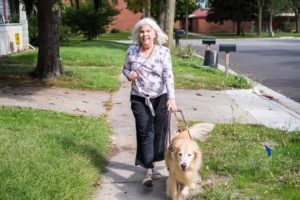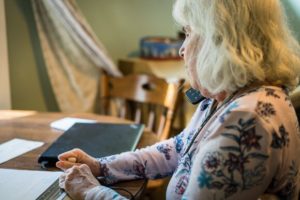By Julie Randolph, Care Coordinator
If you, or a loved one, are facing a progressive eye condition, it is a good idea to start preparations for continued decline in vision. Responding to vision loss takes time, ingenuity, and creativity. The educational and skill building opportunities, along with adaptations to your environment, listed here will make it possible to carry on with many things you love to do!
Cheryl Wade, a trained rehabilitation counselor and advocate, has provided the following options, ideas, and services available to individuals with vision loss. In order to be eligible for state services, you must have a record of a recent eye examination to document that you are legally blind.
State Services
Contact The Michigan Bureau of Services for Blind Persons, at 800-292-4200 or visit their website at michigan.gov/bsbp to request a blindness rehabilitation specialist through its Independent Living Services. The specialist can show you how to navigate your personal space and daily living skills. Janet McInnis, phone 810-252-1656, serves older adults in Midland County. Services include training for white cane use, finding magnifiers that work for the individual, labeling appliances, etc. The Bureau also offers a free training center in Kalamazoo; phone 269-337-3848, where you may spend a few weeks or longer, depending on your skill levels and needs. In person classes instruct individuals on mobility using a white cane, computer skills using speech or enlarged text, and daily living skills such as cooking. Books on cartridges and a cartridge player may be obtained free of charge at the Braille and Talking Book Library at the michigan.gov/bsbp website. A reader adviser will help you find the kinds of books that interest you. To receive an application from Braille and Talking Book Library, call 800-992-9012.
National Services
You may receive a free white cane by visiting the National Federation of the Blind through their website nfb.org. The application will require basic information including your height. A starter cane comes to your armpit, while a more advanced user’s cane should come to the chin. A white cane is not for balance, but is an extension of your arm so that you may survey your environment to find a particular store on a busy block of shops, look for features of a street when you cross, and turn corners safely. The National Federation of the Blind also provides advocacy, legislation initiatives, legal assistance, and an Independence Marketplace featuring talking watches and clocks, magnifiers, medical devices, and household tools. Their Center for Excellence in Nonvisual Access explores access to technology into the future.
Guide Dog and Mobility

Cheryl Wade and her dog, out for a walk in Midland.
A Guide dog helps their master cross streets, walk in straight paths, find features such as stairs and doors, find specific things for you, and follow through stores and other venues. It is a good idea to read brochures from various schools to understand expectations of future dog handlers. Leader Dogs for the Blind in Rochester, MI is the nearest provider and may be reached at 888-777-5332 or their website leaderdog.org. Effective white cane use is required before getting a dog. A free one-week white cane-training course is provided.
Cellular Phone Options
The iPhone, Android, and even flip phones come with the capability of voice recognition. Voicemail, contact lists, email, access to the web, and other features can be created audibly. Smart phone training is available at American Foundation for the Blind at afb.org, Apple, and Google. Apps for the blind have been developed to help you determine the color of an object, identify paper money, prepare and store documents, provide turn-by-turn directions to walk or ride to any destination you request, and determine when it is safe to cross a street. : Some apps provide round the clock volunteers so you are able to speak with a person.
Daily Living Aids
You might want Braille or talking watches, magnifiers, paper with wide lines, things to help you cook by touch, even devices that allow you to create an audio tag to place on items to help you remember the names, doses and other information about your prescriptions. Two excellent clearinghouses with catalogs available are Maxi-Aids at maxiaids.com and Independent Living Aids at independentlivingaids.com.
The American Council of the Blind at acb.org is an activist organization that provides an online radio station called ACB Radio, music, podcasts by blind individuals, along with a “Mini Mall” with tech, carrying devices and other assistive items. Adobe Acrobat Reader DC is a free downloadable program at get.adobe.com/reader/ that allows your electronic device to read PDF documents. To read a document aloud, you will need a screen reader that is part of your computer or purchased separately. Windows machines have built-in narrator while Macs have VoiceOver.
 Blindness Education
Blindness Education
Free courses are available on a wide variety of subjects like Braille, business, and public speaking by contacting the Hadley Institute at Hadley.edu or by calling 800-323-4238. Practical educational courses at this site include safe cooking, organizing your wardrobe, labeling everyday items, household cleaning, exercising, navigating unfamiliar space, and helpful podcasts.
The National Federation of the Blind, described above, has many books, articles, and discussion groups about all phases of blindness. This activist group is a sponsor of NFB-Newsline, a free service that allows you to use your telephone or computer to read hundreds of newspapers and magazines. Products like writing equipment, clocks and watches and other aids that promote independence, are available for purchase.
New services, apps, and tech gadgets are constantly being offered. There are thousands of helpful resources, aids and services. This list only scratches the surface. We hope this information will enhance your life with limited sight.
Local Support and Resources
Blind and Low Vision Support Group Lunch and Learning meets on Saturdays from 11:30-1:30pm at Aldersgate United Methodist Church at 2206 Airfield Lane in Midland. Volunteer drivers are needed to transport members. This Support Group is currently on hold due to COVID-19.
The Midland Lions Club is a non-profit service organization affiliated with Lions Club International. The club has provided sight related services in the Midland community for over 77 years. Membership consists of dedicated individuals in our community who are making a serious commitment to humanitarian service, with the motto being “We Serve.” Meetings occur twice a month. During COVID-19 restrictions, the club has met in a local park or via ZOOM. The club’s regular meeting place is the Midland Country Club. The club collects old glasses to repair and reuse. The ESight project visits schools throughout the area to screen children with vision abnormalities. When an abnormality is identified, the family is directed to an ophthalmologist for corrective interventions. The club also collects monetary donations for the Salvation Army and to help other organizations serving area residents.
Fundraisers include a summer chicken barbecue and donation collection at local stores using a large white cane as the visual display. The club provides an annual party for children with disabilities.
To reach Cheryl Wade, with questions, to participate, or to volunteer with Lion’s Club, e-mail Cheryl at wadecheryl42@gmail.com or 517-574-6898. Cheryl also leads Life after Blindness, a civic charity of the Midland Lions Club.

